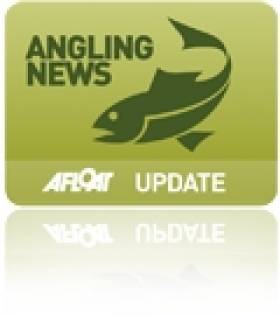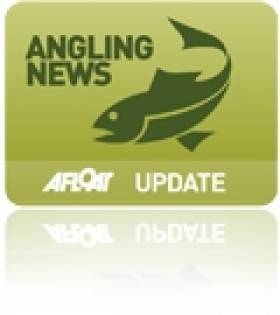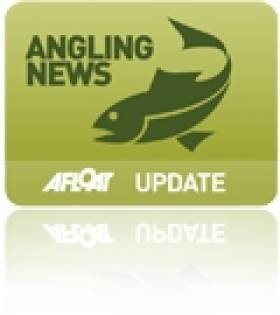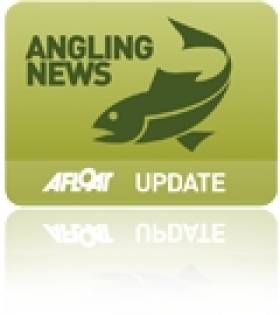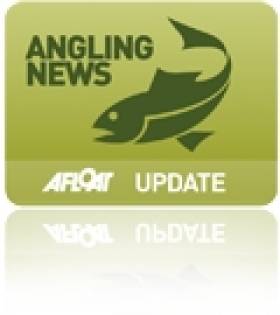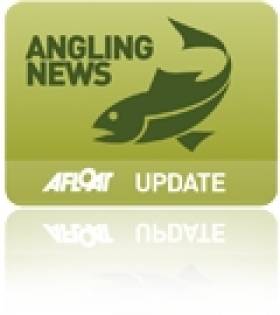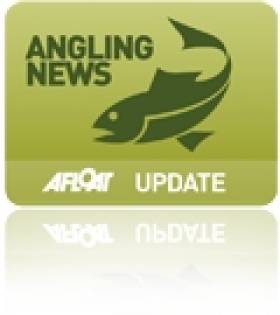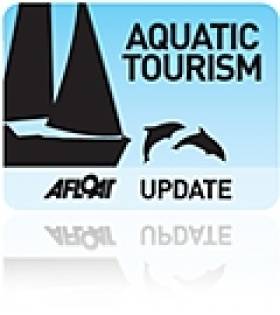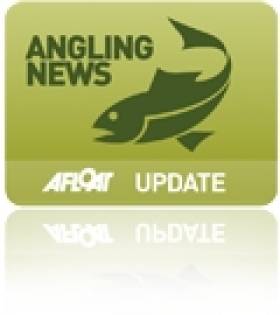Displaying items by tag: angling
Leitrim Gets Funding for Angling Tourism
Funding of more than €200,000 has been announced for new facilities at Lough Rynn in the hopes of bringing a major angling tourism boost to Co Leitrim.
The funding, allocated by Fáilte Ireland and announced by Roscommon/South Leitrim TD Frank Feighan, will provide new fishing pontoons on the lake, as well as a new rowing facility and upgrades to the existing caravan and camping site.
“I’m delighted to confirm this new funding, which will help to make our county even more attractive to tourists," said Depty Feighan. "Co Leitrim is already popular with visiting anglers but we are only just tapping into the potential. These new facilities will help to put us more firmly on the map."
The Leitrim Observer has more on the story HERE.
Kerry Makes Moves to Promote Angling
A recent series of workshops was hosted in Kerry aimed at training angling guides in order to develop the sport in the Kingdom.
The Kerryman reports that 15 potential guides participated in the six-day programme on the River Laune, led by world champion fly-caster Glenda Powell.
Interested individuals were given an introduction to the world of angling guides, covering topics from fishing methods to health and safety, boat handling and teaching fly-casting.
The scheme will soon be supplemented by an online booking system for permits for anyone interested in game angling in Kerry.
Poaching a Problem in Cavan and Monaghan Say Anglers
Anglers in Cavan and Monaghan have launched a new organisation to stamp out what they argue is a growing wave of illegal poaching.
Members of the Lake Watch group told The Anglo-Celt at a recent meeting that a number of organised poachers are operating in the two counties.
The poachers are said to be laying out set lines, long lines and nets on dozens of lakes in a single operation, then quickly loading the fish into vans for removal.
Monaghan baliff Brian Byrne accused both Irish and Eastern European anglers of poaching, camping on lake shores and dumping rubbish.
The meeting also heard that a group of Dublin anglers lit a number of coal fires on a lake shore in Carrickmacross in a two-week period.
Lake Watch members have discussed numerous strategies to combat the poaching wave, including nightly patrols, van seizures and even setting up hidden cameras.
The Anglo-Celt has more on the story HERE.
'No Dip No Draw' Policy for Irish Anglers
Inland Fisheries Ireland has implemented 'no dip no draw' policy for competitive angling to prevent the spread of invasive species in Ireland's inland waters.
The policy, developed by the Irish Angling Development Alliance and endorsed by all affiliated clubs, aims to prevent Irish rivers and lakes coming in to contact with "a wide range of aquatic species of pathigens that could prove harmful to our game, coarse and pike fisheries" and which could "easily and inadvertently be introduced to Irish watercourses through contamination of angling equipment and associated gear".
As a result, disinfection prior to events for any and all angling equipment or tackle that comes into direct contact with fish or water is mandatory.
The IFI provides details for anglers and competition organisers regarding best procedure for implementing the policy in its Code of Practice, currently available online HERE.
Irish Bass Group Chair Gives Praise to 'Wolf of the Sea'
The chairman of the Irish Bass Group gave his praise to the fish described as the 'wolf of the sea' at a recent angling awards day.
John Quinlan told his audience at the Irish Specimen Fish Committee awards that Ireland has "something truly unique" in a marine fish that is reserved for recreational angling.
He also noted that "in spite of 21 years of bass protection, we have never felt secure enough to build the type of industry that this unique opportunity should justify."
Quinlan explained how bass play "a vital role" in the biodiversity of our inland waters, highlighting the interdependence between bass and sea birds.
“There are still magic days to be had bass fishing," he said, adding his belief that "anglers have a right to be involved in the management of our bass stocks".
He continued: "We have looked after them very well over the last 21 years and earned the right to be involved in any decisions about how they should be managed in the future. If we are to be successful we need to be taken more seriously by our Government."
Quinlan pointed to the potential benefits of angling tourism, an area that "has been lacking for far too long".
“The French call bass ‘loupe de mer’ or ‘the wolf of the sea’," he added. "These beautiful fish have hunted in our waters for centuries and I hope they continue to do so for many years to come.”
The Irish Times has more on the story HERE.
UK's National Fishing Month Proves Bigger and Better
National Fishing Month is believed to have encouraged over 200,000 new anglers into the sport through the events held over the last 19 years.
This year's event, 16th July to 14th August 2011, has already got off to a wonderful start with Dean Macey adding his endorsement to the initiative.
Dean commented: "I have been fishing for as long as I can remember and where ever I go in the world, I will always bump into someone that also loves fishing. It's such a great hobby - you get to spend time outdoors, appreciate Mother Nature, meet some great people and if you're really lucky, witness some marvelous creatures.
Dean continued: "When I was a kid, I found it hard to get my head around school work or any kind of discipline. If it wasn't for fishing and athletics I dread to think where I would be right now. Between them, they gave me something to focus on and keep me off the streets.
"Throughout my athletics career, fishing helped me mentally unwind and I'm sure without it, I would have burnt myself out. Whether it's a day on the rivers, sleeping under the stars on a still water for a few days or jumping on a plane to fuel my passion abroad, I don't mind. I love it all, and for the most part, I think almost everyone would if given the chance. That's why I support National Fishing Month and urge everyone to get involved and take part. Everyone I have ever taken fishing has loved it and you can't keep them off the bank now. Give it a go, you owe it to yourself!"
As in previous years, the focus is to encourage every family member to have a go at fishing from whatever cultural or social background they may be from. The initiative's timing continues to be deliberately planned to incorporate the end of the school terms and more of the school holidays to enable activities to be linked with both schools and families. Again, by extending the timetable, fishery owners, angling coaches and retailers will have a greater span of time to be able to take part and support events in their areas.
National Fishing Month aims to highlight and celebrate angling, bringing the sport to the attention of the general public, generate positive PR in all forms of media and to encourage would-be anglers of all ages and from all backgrounds to try angling and to take it up as an environmentally based recreation. There will be hundreds of events all over the country organised by coaches from the PAA and the ADB, on behalf of the Angling Trust, independent fishery owners, the Environment Agency, fishing tackle retailers and manufacturers who give their time, their fishery pegs and loads of products for free.
Richard Wightman from the Environment Agency added: "We are really pleased to be able to continue our support for NFM in 2011 and beyond. This year offers a fantastic opportunity in the shape of a prolonged and well-timed Easter, May Bank Holiday, plus the additional Royal Wedding break at the end of April. What better time to help more people get into and stay in fishing. Let's all do what we can to make the most out of it."
If you would like to take part and have a go at fishing, take a look at the events that are already listed on the National Fishing Month website www.nationalfishingmonth.com <http://www.nationalfishingmonth.com> and enter your postcode. The events closest to you will then be listed and you can find out more details from there.
Minister Lenihan Supports Environmental Initiative on Dublin's River Dodder
In preparation for the field trip Des Chew, Project Manager of the Dublin Angling Initiative visited the school and gave the pupils a talk on water quality, the lifecycle of trout and the art of fly-fishing. The pupils then participated in a field trip along the River Dodder, starting at Rathfarnham shopping centre and finishing at the confluence of the Dodder and Owendore rivers at Bushy Park. Minister Lenihan was joined by TV celebrity and angler Derek Davis.
Fisheries staff from Dublin Angling Initiative and Inland Fisheries Ireland took kick samples and were ably assisted by Gerry Heaslip and Brian McDonagh of the Dodder Angling Club. The children identified invertebrates and their delight could be heard far and wide as they found many different species of stonefly and caddis fly! Looking at water pollution indicators, the children could establish that the presence of these different types of invertebrates indicated the good water quality in the river. This is not surprising given the very healthy stock of wild brown trout in the river.
Minister Lenihan, remarked:
'It is wonderful today to see the young people out learning about their local river. The River Dodder is a very important river in south Dublin, it has good water quality, contains a healthy population of wild brown trout and is a wonderful angling resource.
This is in no small part due to the excellent relationship that the Dublin Angling Initiative and Inland Fisheries Ireland have with the Dodder Angling Club'.
Following this the children were given information packs on fish species, invertebrates and fish species posters. St. Pius X School has participated in Inland Fisheries Ireland's 'Something Fishy' programme in previous years and were thrilled to take part in such an exciting field trip of their local river.
The 'Something Fishy' project was developed by Inland Fisheries Ireland (formerly the Central and Regional Fisheries Boards) in association with Blackrock Education Centre and has proved a highly successful way of encouraging young people to take an interest in Irish fish species, their local environment and habitat. In 2010 almost 1,000 young people participated in the Something Fishy programme within the Eastern River Basin District.
South-East's Coast, Rivers Hold Tourism Potential
Tourist anglers spent €89.9 million in Ireland in 2008, a marine leisure conference in Co Waterford heard recently.
The importance of angling to the economy was highlighted at the Rising Tide seminar in New Ross, an event focused on developing historical connections between Ireland and Newfoundland in Canada in the areas of fisheries, development and coastal tourism.
Speakers noted the "strong maritime tradition" along the south-east coast, the potential of the Waterford Estuary as a gateway to the region's inland waterways, and opportunities for development to tie in with next year's visit of the Tall Ships.
Minister of State for Fisheries, Sean Connick TD, also announced funding of €156,000 for Wexford harbours in tandem with Wexford County Council's allocation of €52,000.
The Irish Times has more on the story HERE.
Irish Anglers Fight to Fish For Their Country
The Irish teams that fished in this year's World Championships and Celtic Cup have vowed to represent Ireland again after a falling out with the national angling body.
Angler's Mail reports that the squads are in dispute with the the National Coarse Fishing Federation of Ireland (NCFFI) over reforms to competition selection that were rejected by the governing body.
The squads contend that the current system of four qualifiers does not allow room for every member of the squad to get a chance to compete.
In a statement they noted that world silver medalist Cathal Hughes was denied a wild card place after charity commitments kept him away from the qualifiers.
They also argue that "extremely fair way of picking a team was agreed on by all, but this was rejected by the federation executive committee, who decided to run with an outdated protocol document rather than take advice from those concerned."
The NCFFI has blamed the economic crisis for the drop in the number of anglers going forward for qualifiication, but this has been rejected by the squads who maintain that "last year’s squads travelled for a fraction of the price of previous years".
Irish Anglers Win Big in South Africa
Ireland's angling team won the 2010 World Shore Championships in South Africa at the weekend.
The combined effort of the five-strong Irish squad was more than enough to see off the strong opposition of teams from Italy and Spain over the week-long competition in Langebaan, 120km north of Cape Town in the Western Cape.
Two Irish fisherman also placed in the top five of the individual table, with John O'Brien claiming silver while Timothy O'Sullivan came fourth.



























